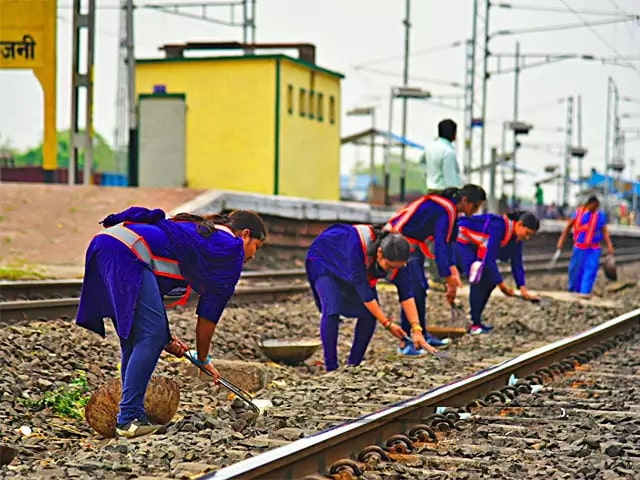Note4Students
From UPSC perspective, the following things are important :
Prelims level: Periodic Labour Force Survey (PLFS)
Mains level: Women's Urban Employment Guarantee Act (WUEGA)

Why is it in news?
- Reducing gender gaps and increasing women’s empowerment are part of the Sustainable Development Goals. Notwithstanding ethical and constitutional imperatives, there is also evidence suggesting that increasing women’s employment rates can be an engine for economic growth.
What is the issue?
- Despite functioning at a fraction of its intended capacity, the Mahatma Gandhi National Rural Employment Guarantee Act (MGNREGA) has been pivotal in providing financial autonomy to women in rural areas.
- More than half the MGNREGA workforce are women. However, urban realities are different. Social norms, lack of safety, and hostile transportation options are some of the factors inhibiting urban women to enter the workforce.
What data is explaining?
- The Periodic Labour Force Survey (PLFS) pegs women’s employment rate in urban areas at 22.9% in the last quarter of 2023. There are clear signs of high unmet demand for employment among urban women.
- First, the unemployment rate in urban areas, which is a measure of how many would like employment (irrespective of whether they are actively seeking it or not), is 9% compared to 4% in rural areas.
- Second, there are two types of unemployment individuals who would like to work and are actively seeking a job versus those who would like to work but may not be actively seeking a job.
- A much larger share of unemployed women in urban areas are seeking employment compared to rural areas. Further, nearly 25% of urban women have completed higher secondary education compared to 5% in rural areas. The low urban employment rates among women also points to wastage of much potential.
- The article presents statistics from the Periodic Labour Force Survey (PLFS) indicating that approximately 10.18 crore women in urban areas aged 15-59 are out of the workforce. When including those who are self-employed or engaged in casual labor, this number rises to around 11.65 crore.
Introducing the Women’s Urban Employment Guarantee Act (WUEGA)
The proposal outlines a comprehensive plan to address urban unemployment through the implementation of a Women’s Urban Employment Guarantee Act (WUEGA). This act aims to provide employment opportunities specifically targeted towards women in urban areas.
- Programme Management and Decentralization: The proposal suggests that women should form at least 50% (ideally 100%) of the programme management staff under WUEGA. This approach not only ensures women’s active participation but also strengthens the constitutional mandate of decentralization by involving local communities in decision-making processes.
- Ensuring Accessibility and Supportive Infrastructure: The proposal emphasizes the importance of providing essential worksite facilities, including childcare facilities, to enable women’s participation in the program. It also advocates for the availability of work within a 5-km radius and proposes free public transportation for women to facilitate their commute to worksites.
- Diversifying Employment Opportunities: The proposal highlights the need to diversify urban works to cater to local needs and wider consultation. It mentions existing examples such as plantation and harvesting reeds on floating wetlands and suggests supplementing the list based on local requirements.
- Incentives and Welfare Measures: This section discusses the creation of incentives, such as automatic inclusion in welfare boards, to encourage women’s participation in the program. It proposes utilizing welfare boards to provide maternity entitlements, pensions, and emergency funds for program participants.
- Skill Development and Apprenticeships: The proposal emphasizes the importance of addressing skill gaps among women to facilitate their transition from school to work. It suggests implementing apprenticeship programs for college students from various disciplines, providing them with opportunities to join as program functionaries and improve their job readiness.
- Information Facilitation Centers and Capacity Building: Here, the proposal suggests establishing Information Facilitation Centers at each urban local body, run by women who have completed Class 10, to provide computer training facilities and bridge the gap in skills. It also advocates for regular capacity-building initiatives to empower these centers and enhance women’s job readiness.
- Social Audit and Monitoring Mechanisms: The proposal recommends the establishment of a social audit unit within WUEGA, comprising at least 50% women staff, for independent monitoring of the program. It suggests that social audits could serve as opportunities for women who have completed Class 12 to join part-time or full-time roles and enhance their job readiness through acquiring various skill sets.
Successful Women-Led Initiatives in Waste Management
- The article highlights successful women-led initiatives, such as the end-to-end waste management program in Karnataka’s gram panchayats. It emphasizes that women not only manage waste collection but also drive ‘Swacch’ vehicles, leading to the acquisition of driving licenses and contributing to the success of the initiative.
Wayforward
- The article discusses the financial implications of the proposed program, estimating that the wage component funded by the Union government would cost around 1.5% of the GDP. When adding material and administrative costs, the total cost is expected to be around 2% of the GDP. It advocates for a phased rollout of the scheme with periodic assessments to smoothen costs.
- Here, the article suggests that the proposed women’s employment program could serve as a foundation for a broader urban employment program encompassing both genders. It argues that the benefits of such a program outweigh fiscal concerns and calls for a shift towards ensuring income assurance, especially for women.
Get an IAS/IPS ranker as your 1: 1 personal mentor for UPSC 2024

